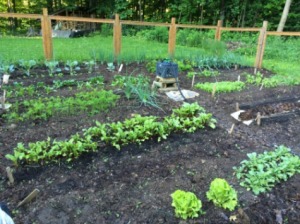
Sometimes, weeding is the best way to learn how to write.
Thinning plants can be as painful as deleting favorite passages of description or dialogue, and just as essential. If seedlings in my garden are two crowded, none of them thrive; if my page is crammed with too many details, I risk losing my readers’ attention.
Weeding out what’s crowded, stunted, or unnecessary is essential, especially since I always start with more than I need. In order to ensure the hardiest, strongest plants, I sow more seed than I will ultimately nurture. Some won’t germinate, and some won’t grow straight and tall; some will have to be thinned. Similarly, I scatter words profligately, knowing that I won’t keep them all, just the ones that hit home.

Weeding is good practice for becoming a strong editor. It’s easy to pluck out the weeds that obviously don’t belong: the ones that grow in the pathways and between the beds. Eradicating the weeds from the vegetables themselves is often more difficult. Some weeds hide or become entwined with the plants I want. Some even look like the vegetable plants I’m cultivating, so I have to differentiate one from the other and then tease them apart. Occasionally, I have to transplant a seedling from one place in the garden to another, to give it a better chance of survival.
It’s the same with my prose: I sometimes have a hard time identifying which words don’t belong; sometimes, I have to recast an entire sentence in order to strike the weedy word out. Sometimes, I have to move a paragraph or a chapter to a new place in the work, where it has a better chance of telling the story at hand.
Every year, I have a new idea for the garden: a clear vision of how I want it to look and what I want it to yield. Every year, it surprises me. Last year, it was cucumbers that grew in abundance. This year, I’ve already harvested pea shoots, two kinds of lettuce, scallions, spinach, herbs and tatsoi, but the radishes, which are supposed to mature in twenty days, haven’t yielded anything in over forty.
When I start a book, I also have what I think is a clear idea. But writing is an act of discovery. I cast many seeds onto the page, see what germinates, and then cull the ones that detract from the narrative arc I nurture to harvest.
Some days, I’d rather weed than write. What’s not to like about squatting in the warm earth, plucking weeds from the soil with the sun on my back, thinking about the work on my desk? Weeding the vegetable patch gives me time to think about what I want to say and the courage to go back and hoe my words.
 Deborah Lee Luskin is the award-winning author of Into the Wilderness, a love story, set in Vermont during the Goldwater – Johnson presidential campaign in 1964. She blogs Wednesdays at www.deborahleeluskin.com
Deborah Lee Luskin is the award-winning author of Into the Wilderness, a love story, set in Vermont during the Goldwater – Johnson presidential campaign in 1964. She blogs Wednesdays at www.deborahleeluskin.com
I could almost imagine myself in my garden weeding Deborah. I love the smell of the fresh soil and the roots of the pulled plants.
You’re so right about the weeding out of unwanted words and the moving around of the paragraphs. That’s what makes writing such fun. You start off with certain ideas and end up with something completely different…as if by magic.
I hope to visit your blog on Wednesday. x
Yes, writing at its best is a journey of discovery – for writer and reader alike! Thanks for reading this post, and hope to “see you” on my personal blog tomorrow. All best.
Weeding the garden is a great analogy for editing, Deborah Lee. There are some great points there.
However, I am helping my children with their writing, which has reminded me of those people who need to flesh out their writing and struggle to find the words and fully develop the story. They need those extra details and to elaborate more.
I am definitely one who needs to pull out the weeds and remember “less is more”.
xx Rowena
So many writers, so many ways to write . . . Some writers are just fearful – sometimes because they’ve been judged harshly – and some writers just haven’t found (or been encouraged to express) their passion. Your kids are lucky you’re encouraging them to write; it’s an important life skill!
Unfortunately, they aren’t encouraging me to teach them. They are very resistant. I finally managed to get my daughter to knuckle down with her violin this year, even though she loved it but she had a huge hurdle getting over those early scrapes. Hopefully, the writing will follow suit.
Perfect metaphor! My first drafts tend to be extremely wordy, so “weeding” my writing is always a somewhat daunting task––but it’s worth it. 🙂
I sometimes have a hard time murdering carrots, but if I don’t, I end up with a stunted crop! As you note, writing’s hard AND worthwhile!
This analogy is very apt. Weeding my garden and “weeding” editing my stories are almost painful processes for me, but so necessary and worth it. Two days ago, I let my mother weed my garden. But then, I have to “weed” her correspondence whenever she asks me.
such an interesting piece it was. loved reading this one. lovely blog! keep up the good work..
Thanks for your kind words!